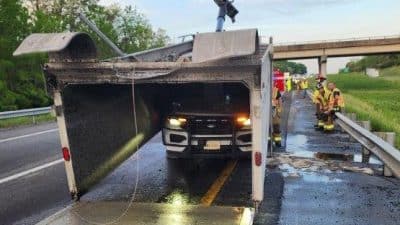Story by Chris Graham
Tom Reynolds didn’t want to see the list of capital projects that Waynesboro City Council had been working on for several months pared down – but he knew what he had to do.
“As this thing began to unfold, I realized, and the majority of the council realized, if we pushed for an up-or-down vote on the ordinance as it was presented, it would fail 3-2. And there would be no winners in that vote – there would only be losers, and that would be everybody in Waynesboro,” the Waynesboro mayor said in an interview on “The Augusta Free Press Show” this week.
The city council had been considering a list of projects that would have had the city borrow more than $26 million to address identified needs in the area of water and sewer system improvements, a new fire station in the city’s West End, a lighted ballfield complex and improvements to the city stormwater-runoff system.
Not everything made the final cut – most notably the ballfield complex and money to complete the fire station. Reynolds still supports borrowing that would allow work to begin on those and other projects left off the list – but he voted to proceed with the scaled-back list because “the goal was to reach a point where we knew we had to move forward.”
To that end, Reynolds and council member Tim Williams, who had expressed reservations about the extent of borrowing that had been proposed previously, sat down over coffee before the vote to discuss what could be done to move at least some of the projects on the list forward.
“He prepared a list, and the majority prepared a list, and each list had nine items on it – and of those nine, six of them matched, dead on matched. So I felt very comfortable that we would be able to move forward on six of the CIP projects,” Reynolds said.
“The process was tedious – but we needed to be tedious because we had to be careful before we came to a vote that we had an ordinance that would in fact pass by a 4-1 majority,” Reynolds said.
The next item on the city agenda relative to the projects involves a possible fall referendum in which city residents would get the chance to weigh in directly on the projects that have been left on the backburner for now.
But first things first – “first of all, we have to see how it is we can do this. And we can only do what the state says we can do,” Reynolds said.
“All of that has to be researched over a short period of time – because our goal is, if we can do it, and how we can do it, to get on the November election ballot, so that it can be considered as soon as possible by the citizens,” Reynolds said.
A fall referendum, of course, means that Waynesboro denizens can expect the rancor that has defined city politics for most of 2007 to continue on to almost the end of the year.
“It’s all part of doing business,” Reynolds said of the heated nature of the political debate in the River City the past several months. “I mean, council’s not always going to agree on issues – and in spite of the fact that we had some heated debate, it never reached a point where council was at odds with one another. We dealt with the issues, and after they were over with, I think people realized and could see that in fact we were debating issues, we were not debating personalities.”
Chris Graham is the executive editor of The Augusta Free Press.










